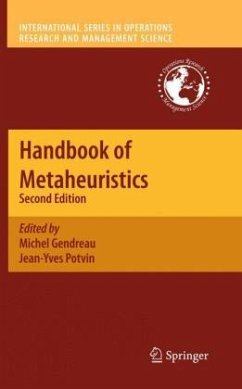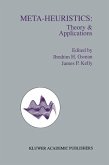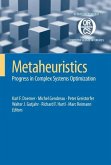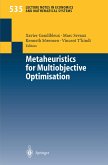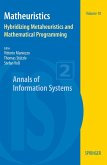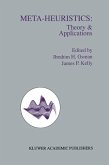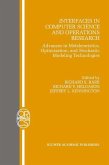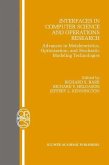The first edition of the Handbook of Metaheuristics was published in 2003 under the editorship of Fred Glover and Gary A. Kochenberger. Given the numerous developments observed in the field of metaheuristics in recent years, it appeared that the time was ripe for a second edition of the Handbook. When Glover and Kochenberger were unable to prepare this second edition, they suggested that Michel Gendreau and Jean-Yves Potvin should take over the editorship, and so this important new edition is now available.
Through its 21 chapters, this second edition is designed to provide a broad coverage of the concepts, implementations and applications in this important field of optimization. Original contributors either revised or updated their work, or provided entirely new chapters. The Handbook now includes updated chapters on the best known metaheuristics, including simulated annealing, tabu search, variable neighborhood search, scatter search and path relinking, genetic algorithms, memetic algorithms, genetic programming, ant colony optimization, multi-start methods, greedy randomized adaptive search procedure, guided local search, hyper-heuristics and parallel metaheuristics. It also contains three new chapters on large neighborhood search, artificial immune systems and hybrid metaheuristics. The last four chapters are devoted to more general issues related to the field of metaheuristics, namely reactive search, stochastic search, fitness landscape analysis and performance comparison.
The rst edition of the Handbook of Metaheuristics was published in 2003 under the editorship of Fred Glover and Gary A. Kochenberger. Given the numerous - velopments observed in the eld of metaheuristics in recent years, it appeared that the time was ripe for a second edition of the Handbook. For different reasons, Fred and Gary were unable to accept Springer's invitation to prepare this second e- tion and they suggested that we should take over the editorship responsibility of the Handbook. We are deeply honored and grateful for their trust. As stated in the rst edition, metaheuristics are "solution methods that orch- trate an interaction between local improvement procedures and higher level stra- gies to create a process capable of escaping from local optima and performing a robust search of a solution space. " Although this broad characterization still holds today, many new and exciting developments and extensions have been observed in the last few years. We think in particular to hybrids, which take advantage of the strengths of each of their individual metaheuristic components to better explore the solution space. Hybrids of metaheuristics with other optimization techniques, like branch-and-bound, mathematical programming or constraint programming are also increasingly popular. On the front of applications, metaheuristics are now used to nd high-quality solutions to an ever-growing number of complex, ill-de ned re- world problems, in particular combinatorial ones.
Through its 21 chapters, this second edition is designed to provide a broad coverage of the concepts, implementations and applications in this important field of optimization. Original contributors either revised or updated their work, or provided entirely new chapters. The Handbook now includes updated chapters on the best known metaheuristics, including simulated annealing, tabu search, variable neighborhood search, scatter search and path relinking, genetic algorithms, memetic algorithms, genetic programming, ant colony optimization, multi-start methods, greedy randomized adaptive search procedure, guided local search, hyper-heuristics and parallel metaheuristics. It also contains three new chapters on large neighborhood search, artificial immune systems and hybrid metaheuristics. The last four chapters are devoted to more general issues related to the field of metaheuristics, namely reactive search, stochastic search, fitness landscape analysis and performance comparison.
The rst edition of the Handbook of Metaheuristics was published in 2003 under the editorship of Fred Glover and Gary A. Kochenberger. Given the numerous - velopments observed in the eld of metaheuristics in recent years, it appeared that the time was ripe for a second edition of the Handbook. For different reasons, Fred and Gary were unable to accept Springer's invitation to prepare this second e- tion and they suggested that we should take over the editorship responsibility of the Handbook. We are deeply honored and grateful for their trust. As stated in the rst edition, metaheuristics are "solution methods that orch- trate an interaction between local improvement procedures and higher level stra- gies to create a process capable of escaping from local optima and performing a robust search of a solution space. " Although this broad characterization still holds today, many new and exciting developments and extensions have been observed in the last few years. We think in particular to hybrids, which take advantage of the strengths of each of their individual metaheuristic components to better explore the solution space. Hybrids of metaheuristics with other optimization techniques, like branch-and-bound, mathematical programming or constraint programming are also increasingly popular. On the front of applications, metaheuristics are now used to nd high-quality solutions to an ever-growing number of complex, ill-de ned re- world problems, in particular combinatorial ones.

